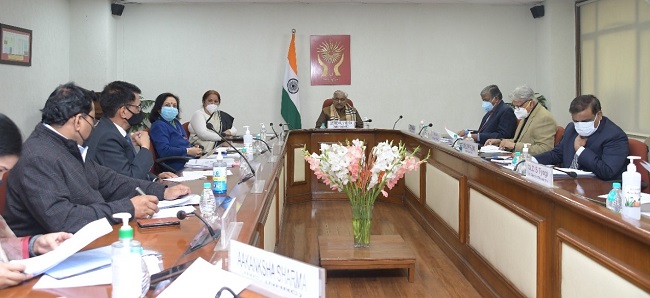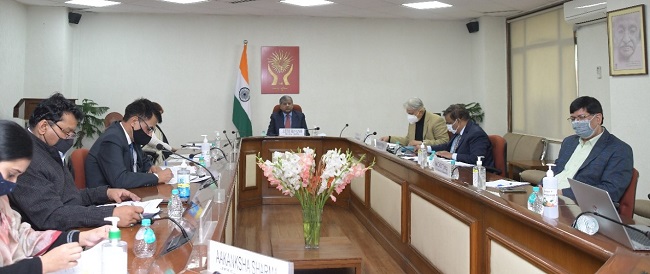The NHRC Core Group on Health and Mental Health expresses serious concerns on the problems and rights of the Leprosy affected people and those affected by mental health problems further aggravated during COVID-19 Pandemic
New Delhi, 22nd December, 2021
The National Human Rights Commission, NHRC, India organized a meeting of its Core Group on Health and Mental Health in hybrid mode at its premises in New Delhi today. The deliberations were divided into two thematic sessions, which included one on the issues related to the human rights issues of people affected with Leprosy and the other on the impact of COVID-19 on the Mental Health and related issues.

Chairing the first session on the issues related to the people affected by Leprosy, Mr. Justice Arun Mishra, Chairperson, National Human Rights Commission, NHRC, India said that there are still many discriminatory laws, which need to be either amended or repealed and replaced with the policies and frameworks that will protect the human rights of the people affected with Leprosy. Their social and economic empowerment needs to be prioritized to bring them in the mainstream of society.
Some of the other important suggestions that emerged after the discussions were as under:
1. Availability and accessibility of resources to the people affected by Leprosy needs to be ensured;
2. The people affected with Leprosy need to be provided with sustained supply of medicines, basic amenities and vocational training to help them make their living to improve their socio-economic conditions;
3. Mental health and rehabilitation of people affected by Leprosy and their families need to be focused on to bring them in the main stream of society;
4. Awareness about the Leprosy needs to be built through a sustained campaign to end myth about the disease and the discrimination against those who suffer with it and their family members, especially their children;

Chairing the second session on COVID-19 and Mental Health, Mr. Justice M.M. Kumar said that mental health sector remains a concern. COVID-19 pandemic has added up to the problems related to mental health issues. He said that the implementation of the advisories issued by the Commission as a guiding principle to deal with this challenge by the concerned authorities will be very useful.
Some of the important suggestions amongst others during the discussions whereas follows:
1. The States should submit Action taken Report on the NHRC Advisories on Mental Health;
2. Increase budgetary allocation for the mental health and in particular for the district mental health programme;
3. Increase dedicated staff for psychiatric care without diverting them for other duties in health sector;
4. Transparency in maintaining data and its methods in every district should be standardized, to avoid disparity in reporting;
5. The concerns on Omicron preparedness and the lack of clarity on the efficacy of the booster dose for COVID-19 vaccine needs to be looked into on priority to avoid mental stress related to it.
Earlier, while triggering both the thematic sessions, Mr. Bimbadhar Pradhan, Secretary General gave a brief insight into the ground realities of the issues related with the Leprosy affected persons and the mental health issues and the concerns of the Commission to improve the situation. He said that the discussions are an effort to understand the gap between the policies and the implementation with the experts and the people working on the ground so that the Commission may send necessary recommendations to the Governments for implementations.
Apart from the NHRC Members, Mrs. Jyotika Kalra, Mr. Rajiv Jain, Joint Secretaries, Mrs. Anita Sinha and Mr. H.C. Chaudhary, Special Monitor, Mr. Ambuj Sharma and other senior officers of the Commission attended the meeting which had participation from the representatives of the Union Ministry of Health and Family Welfare, Alert India, The Leprosy Mission Trust, The Banyan, NIMHANS and AIIMS, Civil Society Members and subject experts, among others.
*****







 राष्ट्रीय मानव अधिकार आयोग, भारत
राष्ट्रीय मानव अधिकार आयोग, भारत

